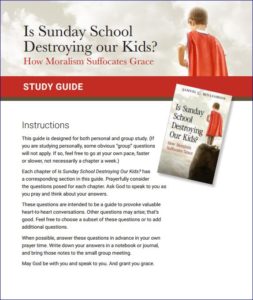Why do so many people—with incredible conversions—parent children who leave Christianity? History overflows with great saints whose offspring lose faith:

- Samuel was a mighty prophet of God. His sons were a mess.
- David was a man after God’s own heart. His children were a disaster.
- Harvard, Yale, and Princeton were founded on the gospel. Now they lead the opposition.
I’ve witnessed dozens of families, churches, and ministries, who began with a furious fire of love for God whose next generation couldn’t blow a smoke ring.
Our children lose fire because of our mother-of-all-assumptions; we assume the gospel. Mack Stiles, in Marks of the Messenger, explains how we believers lose the gospel:
- The gospel is Accepted —->
- The gospel is Assumed —->
- The gospel is Confused —->
- The gospel is Lost
Stiles concludes like this: “For any generation to lose the gospel is tragic. But the generation that assumes the gospel … is most responsible for the loss of the gospel.
We are that generation. We are most responsible. Who has bewitched us?
Forgetting Conversion
It’s virtually 100% predictable that we are converted by one message and then preach another. We are converted by the unbelievable hope of God’s love for those who don’t deserve it, but we lecture on behavior. Everyone I know does it, even when we don’t want to. Including me. And I bet including you.
A friend of mine lived wildly until the age of thirty. He slept with scores of women, drank an ocean of beer, and was a self-admitted, abusive jerk. In a desperate time of loneliness, he heard the hope of the gospel and talked with Jesus. He became a pastor.
He was converted by grace, yet his sermons nagged and scolded:
- You should never tell coarse jokes or cuss.
- You should be generous, and that includes making sure you tip 20%.
- You should always bring your Bible to church.
- You should watch Fox News and never CNN. (I’m serious.)
Day after day, week after week, he proclaimed the Nike gospel, “Just do it!”
The Presumption of Assumption
One day I asked him why his messages concentrated on behavior and not the gospel. He replied, “My congregation knows the gospel. Now they just have to know what to do.” He assumed the gospel but wondered why his shrinking congregation was so joyless.
His own moral life was empowered by a gospel-fueled heart, but he scolded, rebuked, and ragged on behavior. In his personal life, he remembered, “What DID Jesus do?” yet he publicly harangued and lectured WWJD, “What WOULD Jesus do?”
Martin Luther wrote in his Commentary on Galatians,
Continually listen to the gospel that teaches not what I ought to do (for that is the job of the law), but what Jesus Christ has done for me. For that is the gospel.
The gospel is the primary article of all Christian truth. It is most necessary that we should know this article well, teach it to others, and beat it into our heads continually” (slightly edited).
The gospel is God’s love first, behavior second. Moralism doesn’t reject the gospel, it just forgets the gospel and emphasizes behavior. The Gospel is God’s initiation first, then our response. The heresy of the Pharisee is our initiation first, then God’s response.
We need to beat the gospel into our own heads continually, because we constantly assume it, confuse it, and lose it. And if we do, so will our kids.
What Fuels Our Lives?
Will-power fuels moralism; the gospel fuels godliness. “What we do” is moralism; “what God did” is gospel. Will-power hardens: “I straightened out my life, why can’t you?” The gospel softens: “God loved me though I didn’t deserve it, how can I look down on any one else?”
Besides, who gets the glory when our morality increases, us or God?
Jesus says of the prostitute, “She loves much because she was forgiven much” (Luke 7:47), and the Apostle John says, “We love because he first loved us” (1 John 4:19). But we forget God’s action and moralize, “Don’t smoke and bring your Bible to church.”
Our kids reject Christianity because they can’t distinguish it from mere morality.
How Does the Gospel Change Us?
Time and time again, scripture (Jesus) says: Unless you know the why, you’ll never be able to do the what. Unless we have his power, we’ll never obey his commands.
What will make us tell the truth when a lie will get us out of trouble? There are only two options. We harden ourselves with, “Grit your teeth in times of temptation.” Or the gospel softens us with, “God promised to be faithful even when we are unfaithful, and he kept his word though it meant derision, rejection, thorns, and the cross.”
Which god will we worship, the god of self-powered moralism, or the Lord of all grace?
Sam
++++++++++++++++
This post is an excerpt from my book, Is Sunday School Destroying Our Kids. People in the world often reject Christianity simply because they can’t distinguish it from mere morality.
The world needs morality–oppression thrives when consciences are abandoned–but we need more than morality alone. We need the gospel of grace. A gospel that has largely been lost amid the dos and don’ts and preoccupations of religious culture.
Join thousand of other readers who have delighted in this short, story-filled, thought-provoking book on grace.
Buy Now: Is Sunday School Destroying our Kids?
The book is accompanied by a twelve week Study Guide, filled with questions for reflection and exercises for growth; perfect for small groups or personal meditation. To download free Study Guide, Click Here (or on the image to the left).
Click here for a PDF of commonly asked questions about this book: Frequently Asked Questions



 Can a Light Switch Disprove Supernatural Activity?
Can a Light Switch Disprove Supernatural Activity?
Mt 5:39-40.
Each generation makes the same mistake, replacing a love for the messenger with a love for the message. In my observation, many don’t know the difference.
You can’t give what is not yours to give; all you can do is encourage others to receive it for themselves. And that includes our children.
Hi Don,
I really like your closing thoughts. God invites us to “see” Him ourselves, to enter into a relationship with Him ourselves. We cannot “see” Him through the eyes of another, and we cannot make others see Him through our eyes.
Sam
Hi Sam,
Having been “saved” hough the “Gospel of Condemnation” at “Word of Life Camp” when I was 13. I was taken aback by the “realization” that if I didn’t immediately accept Christ’s great death and sacrifice for me, I would be lost to the “eternally burning Fires of Hell” forever.
Having received this “Gospel” I tried sharing the Gospel of condemnation with my contemporaries. None of them were interested. I thought it was because they were so mired in their dark, deplorable natures, that they refused to come out.
It wasn’t until some months later, that a non-believing friend of mine said,”Jack, I think you have Jesus all wrong. He is not about condemnation, but love.” I let that sink in for a while and played “Love vs. Condemnation” against each other in my mind. Eventually, I figured the “:Gospel” I heard was mistaken, so I gave it all up and became a Hippy in Berkeley, CA.
It wasn’t until I was in my 40’s that God revealed himself to me in a way I had not imagined.
Since that time, I have given up on using “The Sinners Prayer” to convict people of their sins and to beg Jesus to forgive and accept them, promising to do better.
I minister to the homeless on Friday afternoons. I had one ask me if “the sinners prayer” was in the Bible. I told him,”no it isn’t”. Then “why would anyone say it” was his response.
I had to agree. I told him forgiveness from The Lord was very easy. Just say you believe in the Lord Jesus Christ as your redeemer and savior and let the Holy Spirit enter into your heart. First “believe then receive.” But that is “too easy” for most people. They believe a meaningful relationship with God has to involve some kind of scripted monologue followed by a lifetime of battling temptations to fall away. Being a believer is not that complex. “Believe and then Receive” is Christianity in a nutshell. Amen?
Hi Jack,
Yes, while the gospel isn’t about condemnation; it IS about conviction of sin. After all, why did Jesus die? Just to show how macho He was? No! But to pay for our sins. That is convicting.
But … and here is the gospel … he died willingly for us, out of love.
So the gospel is two things: a) we are more wicked than we dare admit even to ourselves, and b) we are more loved than we ever dared dream. Both at the same time.
Sam
Great!!